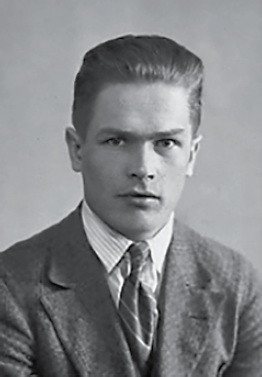Juhani Konkka facts for kids
Juhani Konkka (born September 4, 1904, died June 22, 1970) was a writer, translator, and screenwriter from Ingrian Finnish heritage. He was born in a village called Konkkala, which was then part of the Russian Empire, and later moved to Finland. He is best known for his books that tell stories about his own life and for translating many famous Russian books into Finnish.
Contents
Biography of Juhani Konkka
Juhani Konkka grew up in the village of Konkkala, near Toksovo, in what is now the Vsevolozhsky District of Russia. His family was well-off, and his father, Simo Konkka, was a village leader. Juhani was one of twelve children, though sadly, five of them passed away when they were very young. His father loved books, and their home was always full of them, from the Bible to classic stories.
Early Life and Education
Juhani started writing poems in Finnish when he was just eight years old. He went to elementary school in his home village. In 1917, he began studying in Petrograd (now Saint Petersburg), first at a lyceum and then at an agricultural school. However, he couldn't finish his studies there. His father was arrested by the Bolsheviks, and Juhani, as the oldest son, had to take care of his family.
Escape to Finland
In the autumn of 1919, Juhani's mother was also arrested. At the same time, their family home was taken over. Juhani's father managed to return secretly to the USSR, and Juhani bravely helped his mother escape from prison. Soon after, the Konkka family, including small children, made a dangerous four-day journey through forests to reach Finland. This journey, full of risks, is described in Juhani's book, "Lights of St. Petersburg."
When they arrived in Finland, 15-year-old Juhani immediately joined the army of the Republic of North Ingria, which was a small, unrecognized state. His parents and younger siblings settled in the Rautu area of Finland, where many refugees from North Ingria had gathered.
Return Home and Further Studies
After a peace treaty was signed in October 1920, the Soviet leaders promised that people from Ingria could return home safely. In June 1921, Juhani's family went back to their village, but Juhani decided to stay in Finland to continue his education. He studied at the Impilahti Kansakoulu and then at the Sortavala Teachers' Seminary.
In early 1922, Juhani volunteered to fight in the East Karelian Uprising. During a battle, he was seriously wounded in his leg. After spending several months in the hospital, his right leg became shorter than his left, and he could no longer serve in the military.
Family Separation
Around Christmas in 1923, Juhani secretly crossed the border to visit his family. However, his two younger sisters and brother had joined a youth organization called the Komsomol, and they were not happy to see him. This was the last time Juhani saw his home and his parents.
In 1931, his father, mother, and two younger children were sent away to Siberia. Their old family house was sold for firewood. After two years, his mother and children were allowed to return from Siberia, but they couldn't go back to their home region and had to move to Karelia. His father was sent even further away, to northeastern Yakutia, where he passed away in 1933.
Journalism and Writing Career
On his way back to Finland, Juhani was held by Finnish border guards for a short time. In 1924, he was released and moved to Helsinki. He enrolled in the Higher School of Journalism. To pay for his studies, he worked various jobs during the summers, such as a timber floater and lumberjack. In 1927, he graduated with a degree in journalism.
In 1929, Juhani published his first novel, "Me sankarit" (We Heroes), under the pen name Urho Torikka. This book humorously described his experiences during the civil war in Karelia.
He continued to write many books, including a series of autobiographical novels that told stories from his own life. These included "Summer" (1943), which became a bestseller in Finland, "The Tramps of the Tramp" (1945), "The Schools of the Tramp" (1946), and "The Wanderings of the Tramp" (1947).
In 1958, Juhani Konkka visited Moscow and St. Petersburg as part of a group of Finnish writers. While in St. Petersburg, he tried to visit his old village, but he was not allowed to. That same year, he published his most famous autobiographical novel, "Lights of St. Petersburg" ("Pietarin valot"), which tells about his childhood and youth during a time of big changes in Russia.
Besides writing, Juhani also worked as an editor at the WSOY publishing house for many years (1937-1944 and 1950-1955). From 1949 to 1958, he was also a member of the board of the Union of Finnish Writers.
Translator of Russian Classics
Juhani Konkka was a very important translator of Russian literature. He translated over a hundred books by famous Russian writers into Finnish. Some of the authors he translated include Nikolai Gogol, Fyodor Dostoyevsky, Leo Tolstoy, Anton Chekhov, Maxim Gorky, Boris Pasternak, and Mikhail Sholokhov. For his excellent translation work, he received a special prize in the USSR in 1967.
After receiving his award, Juhani traveled to Petrozavodsk to visit relatives he hadn't seen in over forty years. He shared his prize money with them.
Juhani Konkka passed away on June 22, 1970, at his summer home in Kuhmoinen, Central Finland. He had three children: Anita, Urho, and Heikki.
Awards and Recognition
- Mikael Agricola Award, 1961
- Title of Master Translator, Moscow, 1967


